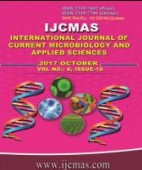


 National Academy of Agricultural Sciences (NAAS)
National Academy of Agricultural Sciences (NAAS)

|
PRINT ISSN : 2319-7692
Online ISSN : 2319-7706 Issues : 12 per year Publisher : Excellent Publishers Email : editorijcmas@gmail.com / submit@ijcmas.com Editor-in-chief: Dr.M.Prakash Index Copernicus ICV 2018: 95.39 NAAS RATING 2020: 5.38 |
Seed-borne diseases are a major problem in Kenya since many farmers have no access to certified seeds. The objective of the study was to study the influence of potato seed production systems on potato seed borne diseases. A survey was carried out in five major potato growing counties in various agro-ecological zones (AEZs). An open ended questionnaire was administered to 59 farmers to collect information on farming practices and disease parameters. Most of the farmers apart from Kiambu County use their own farm saved seeds, buy from the local market and from their neighbors. Some farmers renew seeds from reliable sources with Kiambu leading with about 80% followed by Nakuru (27.3%), Nyandarua (18.2%) and Meru (13.6%) respectively. Bacterial wilt disease and potato leaf roll were detected in all the counties. In case of bacterial wilt, the highest prevalence was in Nyeri County with a prevalence of 90.0%, followed by Meru and Nyandarua each with 81.8%. Most farmers’ use poor quality seeds and due to small farm sizes they are unable to practice crop rotation leading to high prevalence’s of bacterial wilt and potato leaf roll virus.
 |
 |
 |
 |
 |